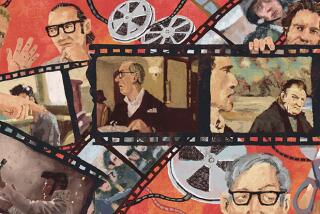A major return
- Share via
Sam PECKINPAH was a director who felt things deeply, and never more so than when he considered the destiny of his ill-fated 1965 western, “Major Dundee.” It was a film the director nearly had taken away from him, a film whose final editing was done without him, a film whose ultimate disposition he never got over.
“ ‘Major Dundee’ was one of the most painful things that ever happened in my life,” Peckinpah has been quoted as saying. “When you see it being mutilated and cut to pieces, it’s like losing a child or something.” The film, he liked to reiterate as the years went on, was “possibly the best picture I’ve ever made in my life.”
Given the near-mythological aura that statements like that have created, it’s well worth noting that, 40 years after the fact, what Sony is calling “the extended version” of “Major Dundee” is debuting today, giving us a look at a cut of the film that is undeniably closer to what Peckinpah intended.
Though it doesn’t approach the legendary two-hour, 40-plus-minute first cut Peckinpah was reputed to have put together, the new “Dundee” -- overseen by Grover Crisp, Sony’s vice president for film restoration, who’s been trying to assemble all the elements since 1991 -- does restore 12 critical minutes that were taken out after an especially unhappy preview.
In another move sure to posthumously please the director, the film’s upbeat and unloved original score, which included a title song sung by the un-Peckinpahian group Mitch Miller and his Sing-Along Gang, has been replaced. Although the DVD version will allow viewers to chose between both, the new music, written by Christopher Caliendo, is more somber and more of the period.
It is fascinating to compare this new version with the legend, to consider how good a film it actually is and what it tells us about the kind of movies Peckinpah was destined to make and the kind of individual he continued to be.
For in some ways the character of Major Dundee, a driven, implacable Union officer circa 1864 who makes use of everyone from Confederate prisoners to freed slaves as he invades Mexico in pursuit of a renegade Apache chief named Sierra Charriba, resembles no one so much as the director himself.
Though Peckinpah approved when actor R.G. Armstrong called it “ ‘Moby Dick’ on horseback,” costar James Coburn got closer to a more personal truth. When he heard Peckinpah call Dundee someone who “survives and continues,” the actor reported later, he knew who that description fit best.
By all reports, the shooting of “Major Dundee” was a trying business, as grueling on the crew as the major’s raid was on his troops. The picture came in 15 days late and 50% over its approved budget, causing enough chaos that the studio tried to have Peckinpah, who was eventually barred from the editing room, removed from the shoot. Only the chivalrous gesture of star Charlton Heston, who literally gave back his salary, stood between Peckinpah and an ouster.
Seen today, “Major Dundee” plays like a standoff between a traditional western and Peckinpah’s dark, modern attitude. Though it’s intriguing to see the director do his best to make this shotgun marriage work, his nihilist spirit does not fit well with the kind of film the studio would even consider giving a Mitch Miller chorus to.
Though star Heston tries his hardest, attempting to move to the dark side as James Stewart so successfully had before him in such films as “The Man From Laramie,” he is simply not ideally cast as the brooding, malevolent major who goes his own way.
On the other hand, it is stirring to see the actors we now think of as the Peckinpah stock company, performers like Warren Oates, Ben Johnson, L.Q. Jones, Slim Pickens, Dub Taylor and R.G. Armstrong, make a group appearance.
The real virtue of “Major Dundee,” for Peckinpah and for us, was as a first rough draft of another film about tough Americans trying to shoot their way out of deepest Mexico. It’s hard to imagine “The Wild Bunch” having the depth and grace it did without Peckinpah having this experience to draw on, and for that masterful film alone we’re grateful to have “Major Dundee” back among the living again.
More to Read
Only good movies
Get the Indie Focus newsletter, Mark Olsen's weekly guide to the world of cinema.
You may occasionally receive promotional content from the Los Angeles Times.









